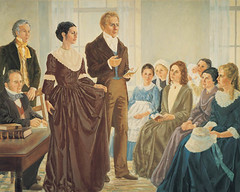
The so-called “separate but equal” legal doctrine purported to empower state governments to discriminate against individuals on the basis of their race. Cruel stories highlighting the problem with such an approach fill volumes of books, all pointing to the evident injustice of the law.
In the landmark SCOTUS case Brown v. Board of Education the justices opined, “Separate educational facilities are inherently unequal”—thus beginning to dismantle the inequality perpetuated by the state through its favorable treatment of one group over another.
The underlying reason for which such a legal system was so egregious is that the government is comprised of the citizens over which it governs. Thus, no unjustly discriminatory action can be undertaken that favors one class of citizens over another. No authority exists to restrict government services or offerings to one group and exclude them from another, when all pay taxes to fund them, and when said government only legitimately operates with the collectively delegated authority of every class of citizen.
Looking back through America’s history of institutionalized racism, we turn up our nose and repudiate the actions of our ancestors.
Today, some members of The Church of Jesus Christ of Latter-day Saints are seeking to be progressive in pushing for a rejection of “separate but equal” status in the church’s clergy. They see similar discrimination, this time on the basis of gender, and desire that women be ordained to the priesthood and allowed to govern the Lord’s kingdom, just as their male counterparts have historically done. Praising the civil rights movement of yesteryear, they see in themselves the same leadership and nobility of cause.
They are wrong.
Whereas governments usurped authority that was not theirs in justifying and mandating discriminatory segregation, the Lord’s kingdom operates with the King’s authority. His discrimination is justified on the basis of his authority alone, and though the church can change its operations by common consent, the priesthood—the King’s delegated authority—can only be conferred by the methods He establishes. If He says only men, then so it shall remain. As the Psalm says, “For the kingdom is the Lord’s: and he is the governor among the nations.”
As it currently stands, doctrinal discrimination justifies a “separate but equal” status in the church. As Julie Beck said, “As sons and daughters of God, we each have unique [or separate] responsibilities and roles, and through the blessings of the priesthood, we are all given equal partnership, gifts, and blessings.” Elder Ballard affirmed that the separateness, or what he called “diversity,” is what allows for equality in God’s kingdom:
Even though men and women are equal before God in their eternal opportunities, they have different, but equally significant, duties in His eternal plan. We must understand that God views all of His children with infinite wisdom and perfect fairness. Consequently, He can acknowledge and even encourage our differences while providing equal opportunity for growth and development.
In summary, discriminatory segregation is unjustified when enforced through secular government, as no such authority exists to delegate to the state, but it is justified within the Church as sole authority exists with and through God. In other words, when we delegate our innate authority upwards to government, segregation is morally reprehensible, but when authority is delegated downward by God, we lack any standing or cause to complain.
Continue reading at the original source →



